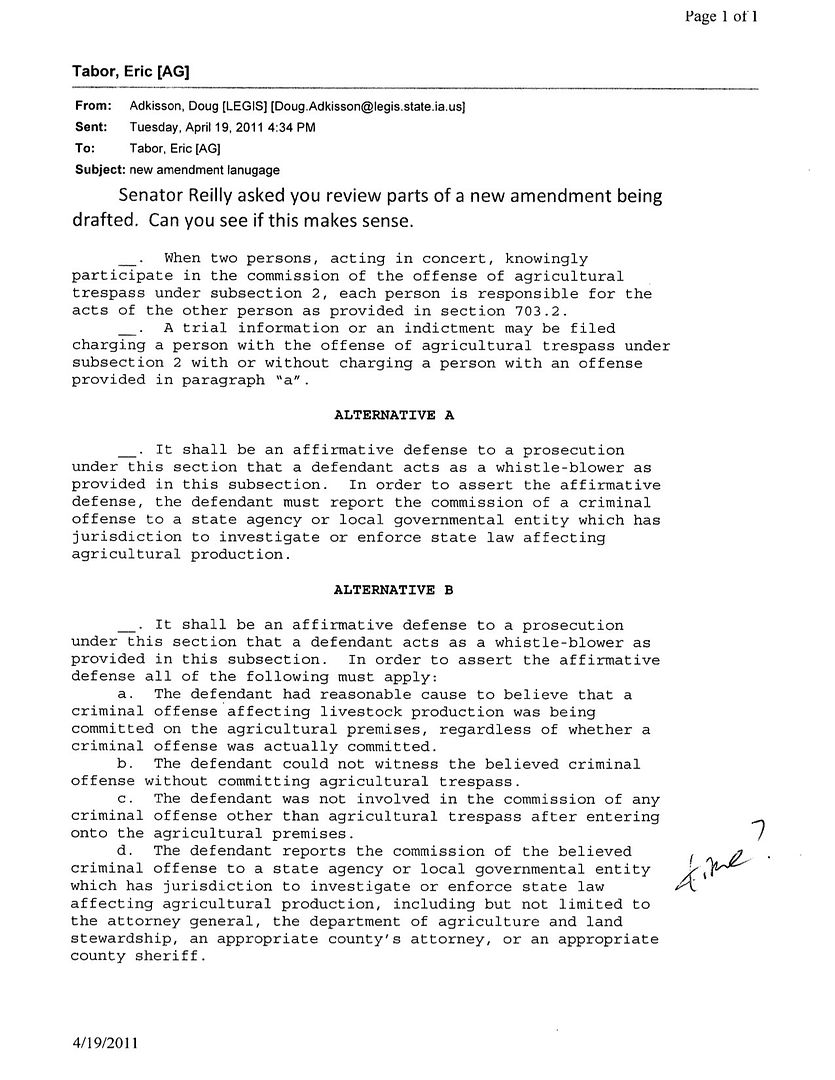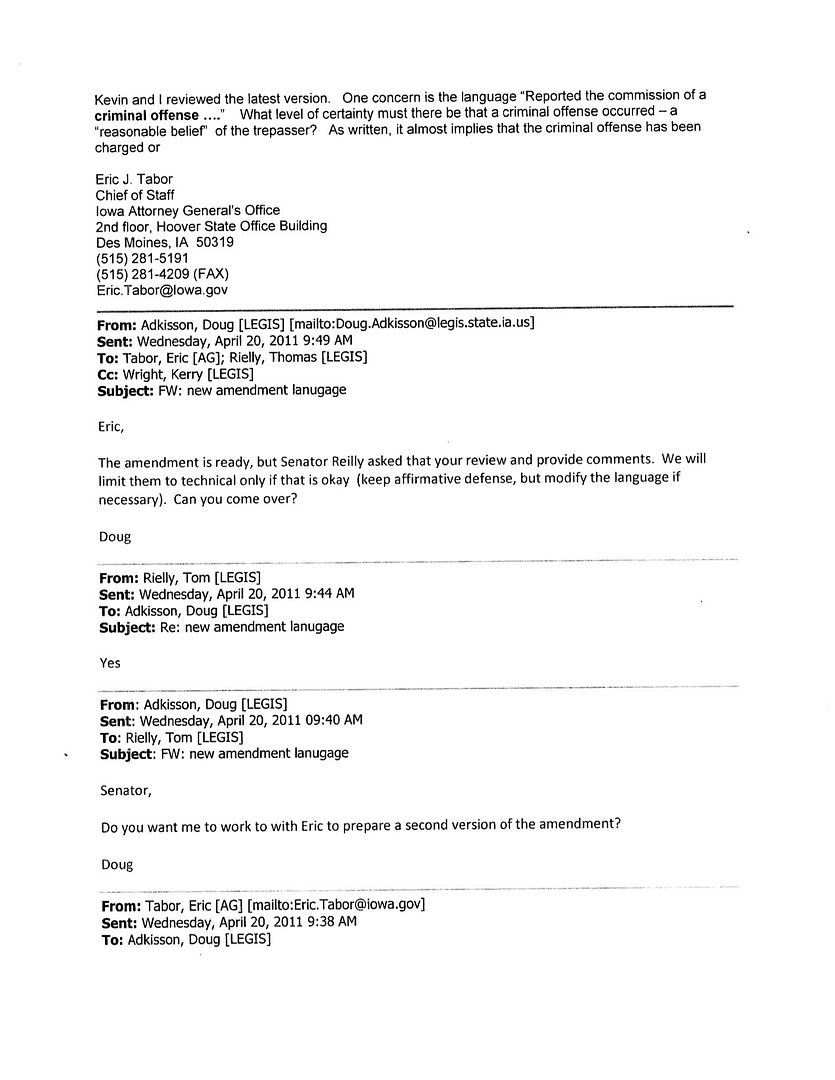A U.S. District Court ruling in August inspired today’s edition of Throwback Thursday. That ruling struck down an Idaho law making it a crime to lie to obtain employment at an agricultural facility, among other things. Iowa was the first state to adopt what critics call an “ag gag” law, aimed at making it harder for animal rights or food safety activists to obtain undercover recordings at farms or slaughterhouses. Idaho’s law went further than the bill Governor Terry Branstad signed in 2012; for instance, the Idaho statute also banned unauthorized audio or video recordings at a livestock farm or processing facility. Still, to this non-lawyer, some passages of federal Judge Lyn Winmill’s ruling (pdf) suggested that Iowa’s prohibition on “agricultural production facility fraud” might also violate the U.S. Constitution, specifically the First Amendment’s free speech clause and the Fourteenth Amendment’s equal protection clause.
Bleeding Heartland posted relevant excerpts from the Idaho ruling here, along with a brief legislative history of House File 589.
I sought Governor Terry Branstad’s comment on the court ruling and whether Iowa lawmakers should amend or rescind the language in Iowa Code about “agricultural production facility fraud.” In response, the governor’s communications director Jimmy Centers provided this statement on August 6:
House File 589 passed with bipartisan support and under the advice and counsel of the Attorney General’s office. The governor has not had the opportunity to review the ruling from the federal court in Idaho and, as such, does not have a comment on the case.
“Under the advice and counsel of the Attorney General’s office” didn’t sound right to me. When I looked further into the story, I learned that the Iowa Attorney General’s office neither recommended passage of this law nor signed off on its contents.
Chief Deputy Attorney General Eric Tabor was the chief of staff to Attorney General Tom Miller when state lawmakers were considering House File 589 in 2011 and 2012. Tabor has also been a registered lobbyist for the Attorney General’s office when the legislature is in session. He spoke to me in August about his discussions with state lawmakers regarding the ag gag bill, which first passed the Iowa House in 2011. That version prohibited “animal facility interference” in various forms, including unauthorized audio or video recordings. In Tabor’s words, it was “clearly unconstitutional,” and he told key state senators so at the time.
The Attorney General’s office suggested a different approach: a beefed-up criminal trespass statute for agricultural facilities. Tabor explained that they were “trying to be helpful” for “well-intentioned senators” wanting to “do the right thing.” He added, “What we tried to do was take a really bad statute and make it better.” To avoid constitutional problems, the statute would allow anyone charged to offer an “affirmative defense” if they had reason to believe illegal activity was occurring at the farm or processing facility. Tabor told me the concept was that whistleblowers would have to report such alleged illegal activity within 72 hours of recording it and turn over materials gathered to law enforcement. When I asked whether the bill would have required handing over all materials, or whether whistleblowers would be able to keep copies of recordings, Tabor said the concept never got to the point of legislation being fully drafted and ready for consideration.
Tabor’s conversations did lead to some legislative work on criminal trespass provisions that could have been offered as part of a substitute amendment for House File 589. The Iowa Senate Agriculture Committee had approved House File 589 in March 2011. Responding to my records request, the Attorney General’s office provided a few pages of e-mail correspondence showing that the following month, Democratic State Senator Tom Rielly asked staff to run some alternative language by Tabor and his colleagues. I’ve enclosed that correspondence at the end of this post.
Unfortunately, most of the communication between Tabor and Iowa Senate members and staff about the ag gag bill was verbal rather than in writing. I was told that the Attorney General’s office did not have any additional e-mail correspondence referencing House File 589. Because legislative documents are exempt from Iowa’s public records law, I was not able to obtain e-mails or staff memos circulated within the Iowa Senate regarding different approaches to protecting agricultural facilities.
The ag gag bill never came to the Senate floor during the 2011 session. Rather, it sat in “unfinished business” until senators worked out new language in early 2012. Once key Democrats and Republicans had agreed on the compromise, the amended House File 589 passed the Iowa Senate and House with bipartisan majorities in a single day. Click through to see which Democrats voted for and against the revised ag gag bill. Every Republican present in both chambers voted yes.
For the past two months, I have sought further information on why state senators rejected advice from the Attorney General’s office and opted to prohibit “agricultural production facility fraud,” including misrepresenting oneself to gain employment, rather than giving facilities in that sector extra protection from trespassing. Unfortunately, Senator Rielly, who retired from the legislature in 2012, has not responded to my repeated–and I mean repeated–requests for comment.
Tabor told me the Attorney General’s office had a “neutral” position on the final version of House File 589. The lobbyist declarations show that he was registered as “undecided,” which is how lobbyists indicate that their clients are neither for nor against a bill.
I asked Tabor about the U.S. District Court ruling from Idaho, which judged misrepresentation provisions similar to Iowa’s law to be both content-related speech restrictions (impermissible under the First Amendment) and violations of the equal protection clause of the Fourteenth Amendment. He countered, “That was just one [federal] district,” and the case is not over, because the ruling could be appealed. In Tabor’s opinion, the Attorney General’s Office probably could defend Iowa’s statute if it were challenged in court.
I understand why the criminal trespass approach seemed like easier ground to defend, but for what it’s worth, Judge Winmill did not find Idaho’s trespass provisions to withstand scrutiny. From pages 23 and 24 of that ruling:
The State contends that the purpose of § 18-7042 is to protect the private property of agricultural facility owners by guarding against such dangers as trespass, conversion, and fraud. But the State fails to explain why already existing laws against trespass, conversion, and fraud do not already serve this purpose. The existence of these laws “necessarily casts considerable doubt upon the proposition that [§ 18-7042] could have rationally been intended to prevent those very same abuses.” Moreno, 413 U.S. at 536- 37.
Likewise, the State fails to provide a legitimate explanation for why agricultural production facilities deserve more protection from these crimes than other private businesses. The State argues that agricultural production facilities deserve more protection because agriculture plays such a central role in Idaho’s economy and culture and because animal production facilities are more often targets of undercover investigations. The State’s logic is perverse-in essence the State says that (1) powerful industries deserve more government protection than smaller industries, and (2) the more attention and criticism an industry draws, the more the government should protect that industry from negative publicity or other harms. Protecting the private interests of a powerful industry, which produces the public’s food supply, against public scrutiny is not a legitimate government interest. […]
As the Supreme Court has repeatedly said, “a bare congressional desire to harm a politically unpopular group cannot constitute a legitimate governmental interest if equal protection of the laws is to mean anything.” Moreno, 413 U.S. at 534. As a result, a purpose to discriminate and silence animal welfare groups in an effort to protect a powerful industry cannot justify the passage of § 18-7042. Id. at 534-35.
When I asked Tabor what would be the grounds for giving agricultural facilities special protection against trespassing, beyond what exists in Iowa law, he replied, “That was a legislative decision. […] That was the legislature’s decision to treat agriculture differently.” The idea behind House File 589 did not come from the Attorney General’s office.
I want to learn more about who influenced the final edit of the ag gag bill before it flew through the legislature in February 2012. If I can ever get any state senators or staffers who were involved in those decisions to speak to me on the record, I will follow up with another “Throwback Thursday” post.
For now, we can conclude that the governor’s spokesman was wrong to imply that the Attorney General’s office supported the ag gag bill’s goals or content. Miller’s staff convinced state senators to remove the most blatantly unconstitutional language about audio and video recordings, but Tabor and his colleagues did not promote the “agricultural production facility fraud” approach, nor did they endorse the big idea behind the legislation (offering the agriculture sector special protection from whistleblowers). The Attorney General’s office didn’t even register its lobbyist in support of the final bill.



